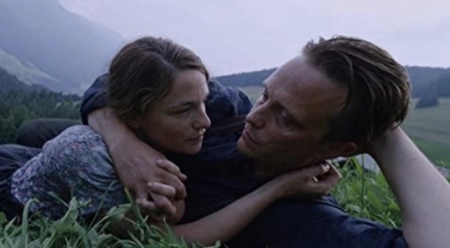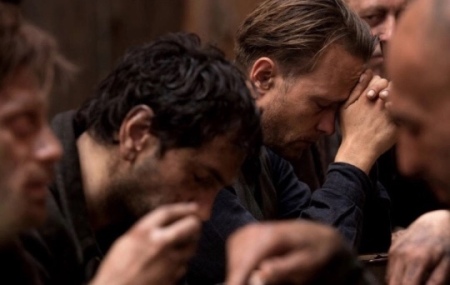A Hidden Life

Director: Terrence Malick
Screenplay: Terrence Malick
Starring: August Diehl, Valerie Pachner, Matthias Schoenaerts, Franz Rogowski, Bruno Ganz, Michael Nyqvist, Wolfgang Michael, Karl Markovics, Ulrich Matthes, Tobias Moretti, Maria Simon, Martin Wuttke, Johannes Krisch, Johan Leysen.
“Better to suffer injustice than to do it”
Despite his reputation of being a very philosophical and existential filmmaker, it’s fair to say that not everyone responds favourably to a Terrence Malick picture. He has such an idiosyncratic and ponderous style that some viewers simply don’t have the patience for him. Even those that do, didn’t take kindly to his recent trilogy of contemporary set-works To The Wonder, Knight Of Cups, and Song To Song. That said, when Malick is working on stories from the past, he’s able to excel and fully realise the themes that he endeavours to express. A Hidden Life sees Malick return to a bygone time in history that suits his craftsmanship but, more importantly, sees him return to scintillating form.

Plot: Based on the true story of Franz Jägerstätter (August Diehl) is a farmer living in St. Radegund, Austria in 1939 where he lives peacefully and devotedly tends to his land and family alongside his community. However, as WWII breaks out, he’s called up to serve in the German army to fight for the Nazi’s. As a man of principles, Franz doesn’t believe in the war effort and refuses to swear an oath to Hitler. As a result, he’s turned on by villagers and sent to prison where he faces the threat of execution for treason.

Within minutes of this film opening, it’s apparent that Terrence Malick has not compromised his style in the slightest. Mood and Malick are synonymous with one another and, yet again, we ease into another of his ruminations on life, love and living off the land. Set within the backdrop of beautiful Austrian landscapes with the roaming camerawork perfectly attuned to the poetic dialogue that’s overhead from the two principal characters of Franz Jägerstätter and his beloved wife, Fani. Understandably, Malick’s ruminative style isn’t for everyone but there’s such poetic beauty to his work that I’m often captivated. It feels like he just swabs with you with the warmth of life and the simple and loving exchanges involved. However, Malick isn’t solely a romanticist as he’s also able to fully remind you of the fragility and delicacy of life and the heartache that’s never far away. In combining these perspectives, he delivers a work of such tremendous beauty and heartache which ranks among his best films.

For many, Malick’s masterpiece is 2011’s The Tree of Life and while it is, undoubtedly, a work of absolute brilliance, 1995’s The Thin Red Line is just as good. Somewhat overshadowed by the gung-ho patriotism of Saving Private Ryan upon its release, Malick’s WWII epic was a fragmented and deeply profound mediation on war. It was a vastly different film that looked at war through the eyes of several soldiers, not least it’s main protagonist, Pvt. Witt (played by Jim Caviezal) who happened to be a conscientious objector. It’s with this in mind, that A Hidden Life feels like a welcome return to a theme that Malick has explored before and with the similarities involved it feels like a fitting companion piece.

In the the earlier moments of the film, Malick builds slowly and expertly captures the looming dangers of war as it creeps ever closer to the idyllic lifestyle of Jägerstätter and his family. It’s this powerful attention to detail that thrusts you into the nightmare about to ensue. Throughout his work, Malick has always come across as a god fearing philosopher and with this particular story he’s able to fully explore the themes of free will and responsibility and also address the church’s complicity with the state. And it’s here that Malick questions religion directly. Whether or not you’re of a religious persuasion doesn’t really matter. It’s a part of existence regardless and one must at least consider the allusions of a creator who also creates evil. It’s these weighty themes that take precedence throughout the latter half of the film as Franz is tormented by captors and his (Christ like) decision to stand by his beliefs. The existence of god and his abandonment became the crux and philosophical explorations with the inevitable suffering that the early part of the film suggested becoming fully realised.

As much as this focuses on the historical genocides committed in Europe during the Second World War, Malick himself is an American and all too aware of the parallels of this story in our current political climate as masses of people either support or ignore the right-wing dictatorships directly under our noses. The comparisons are worrying, which makes this a timely film in an age where it would seem that we are in desperate need of a reminder on history or the dangers of political apathy. “If our leaders are evil,” asks Franz, “what are we to do?”. It’s an important question, especially when our current western leaders preach their devotion to Christianity. I would be wise to embrace another of the film’s important quotes… “There’s a difference between the suffering we can’t avoid and the suffering we choose.”

Verdict: If we consider the lonely prairie landscapes of Days of Heaven, the ruminations on existence of The Tree of Life and the suffering involved during war in The Thin Red Line then A Hidden Life feels like a culmination of everything that’s been successful in Malick’s filmography thus far. In other words, it’s another masterwork from this very special director.

Mark Walker
Trivia: The screenplay of the film opens with a quotation from philosopher Soren Kierkegaard: “The tyrant dies, and his rule is over; the martyr dies, and his rule begins.”
June 15, 2020 at 8:58 pm
Nice review Mark. It’s odd, I’m a big Malick fan, and amongst the few people who really loved Knight of Cups and found much to appreciate in To The Wonder and Song to Song, but I couldn’t connect much to A Hidden Life. I admire that Malick was trying to make a bold political statement in the face of right-wing nationalism that’s unfortunately too prevalent in the world (and the complicity of religious institutions in abetting this movement), but Malick does not do much to sketch out Franz’s character or detail his change of heart and personal objections to the Third Reich. And this may be the first Malick movie where at least a third of the film consists of interior shots. There were moments that really struck me (the trial sequence hit me hard and I teared up a bit seeing Bruno Ganz) but I was a bit disappointed.
LikeLiked by 1 person
June 16, 2020 at 5:40 pm
Interesting, man. I struggled with Knight of Cups and really disliked To The Wonder. Song to Song was more of the Malick that I love and I really responded to A Hidden Life as you can see. I didn’t really question Franz’s character or motivations much. I just accepted them as they reflect what I would like to believe would be own choices given similar circumstances. Who know’s? I think that’s I found most intriguing about the film and I just adored the cinematography and pacing as I often do with Malick.
LikeLiked by 1 person
June 16, 2020 at 6:42 pm
One thing I noticed is that many critics who weren’t fond of Malick’s post-Days of Heaven movies seemed to appreciate A Hidden Life the most (one friend of mine who was alienated by Malick’s previous films really enjoyed the movie, making me interested in seeing this again).
LikeLike
June 15, 2020 at 10:33 pm
Great review Mark, this is a Terrence Malick movie I am yet to see but absolutely am dying to. Many trusted sources I keep up with rated this up there with the best of 2019. Great to see that kind of potential still there with Malick; he’s a master of the visual and the aural, even if yeah, things like Knight of Cups and To the Wonder, from a narrative perspective at least, come across a little pretentious and overly self-conscious.
LikeLiked by 1 person
June 16, 2020 at 5:44 pm
Hey buddy. It’s been a while. Much obliged for checking in.
Yeah, Malicks recent output has definitely came across as self Indulgent and pretentious but A Hidden Life seems him back to his best. I also consider it among the top films of 2019. Beautiful piece of work.
LikeLiked by 1 person
June 15, 2020 at 11:16 pm
My favorite move of 2019. I’ve seen it four times (at least). Each time I find myself completely swept up in it. This may be crazy-speak, but I count it among TM’s very best.
LikeLiked by 1 person
June 16, 2020 at 5:47 pm
Not crazy speak at all, brother. I’m with you on that. This is definitely up there with Terry’s finest. I remember you placing it #1 on your year end list. You’re not wrong. It’s a fantastic film.
LikeLiked by 1 person
June 16, 2020 at 4:46 pm
Dammit! I keep forgetting to watch this! Those whom I admire with regards to film reviews think this is awesome. Thank you for reminding me!!!
LikeLiked by 1 person
June 16, 2020 at 5:47 pm
Many seem to have let it slip by, Cindy. Do check it out if you enjoy Malick. It’s beautiful.
LikeLiked by 1 person